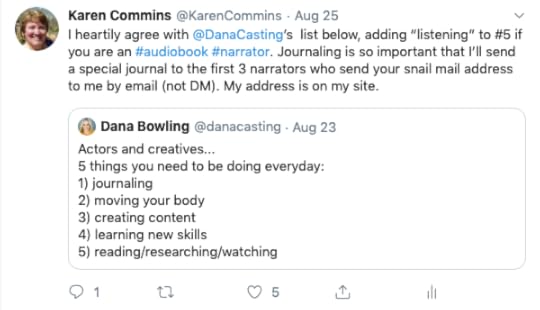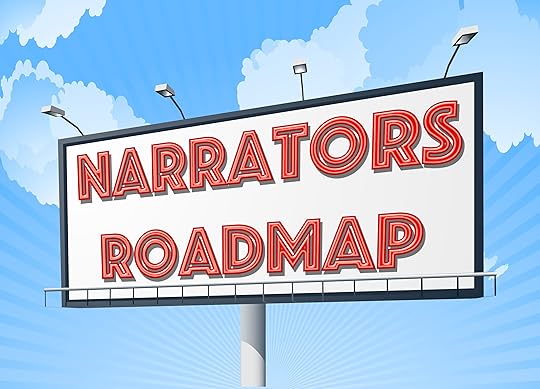Karen Commins's Blog, page 5
September 1, 2019
20 Things Learned in Last 20 Years

Happy 20th anniversary to me!
I launched my voiceover business 20 years ago.
Since my last post was about using my journal, it’s only appropriate that this one goes back to where it all began, my first entry in my first book.

Saturday 8/28/1999 9:25pm
I’m spending my evening copying the CD of my first voice-over demo with the plan to mail a few to agents on Monday. How I got to this point and where I go from here will be the subject of this journal.
Friday 9/3/99 10:15pm
On Wednesday, September 1, 1999, I mailed 3 CDs to [3 Atlanta VO agents]. It was such a huge step, and I felt a tremendous sense of accomplishment and excitement to have pushed the dream out to people who could do something about it!
The past 20 years have been a remarkable evolutionary journey, to say the least! As I was reflecting on all that I’ve seen, read, written, voiced, and otherwise done in that time, I decided a blog post of 20 things I’ve learned would be a great way to celebrate this milestone!
So here’s the list, in no particular order. By the way, you’ll find more private journal entries sprinkled throughout these articles!
1) As I wrote in my journal on 8/30/99 (the part highlighted in green is from that journal entry), all of your family or friends won’t necessarily support you in your efforts to follow your dreams. That’s okay. People are in your life for a reason, a season, or a lifetime.
2) Like so many people, I mailed my first demo to VO agents without first establishing I was a marketable commodity who could offer them something they didn’t already have among the people they represent.
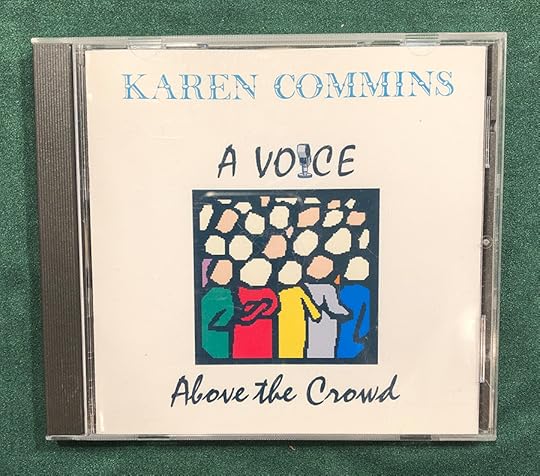
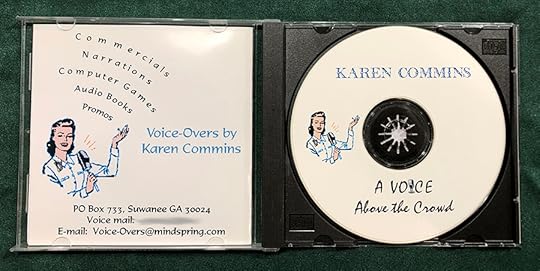
3) My library has a smorgasbord of material that will help me move forward in this career.
4) Every freelance voice talent/audiobook narrator needs a web site so people can find you. You wouldn’t believe how many times I see people asking on Facebook for contact info for a certain audiobook narrator. For what it’s worth, I’m on version 4 of my web site, and it probably won’t be my last.
5) Being a creative person in the public eye means that bad reviews go with the territory. If the reviews reveal a trend, it’s time to work with a coach to improve. Otherwise, shrug off the criticism.
6) I learned 6 valuable lessons from my first voiceover job.
7) If you don’t have work, create your own, and then do it again.
8) When the idea fairy hands you an inspired idea, act quickly because ideas love speed.
9) People who are price shoppers will cause you to spend the most time on their project, aren’t easily satisfied, brag to their friends about beating you down on price, and are often the slowest to pay. I don’t compete on price but instead market my strengths to prospective clients.
10) I’ve read a lot about the Law of Attraction. I constantly must remind myself to not complain and instead think/speak/write what I want into existence.
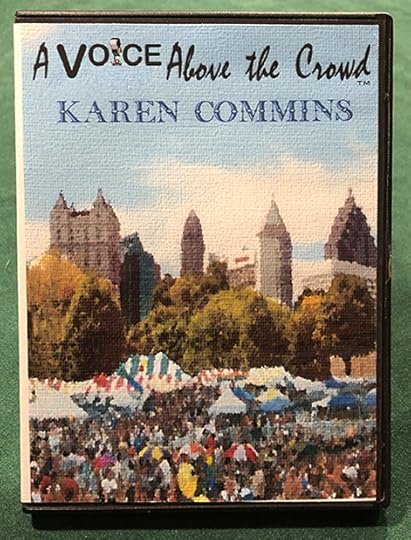
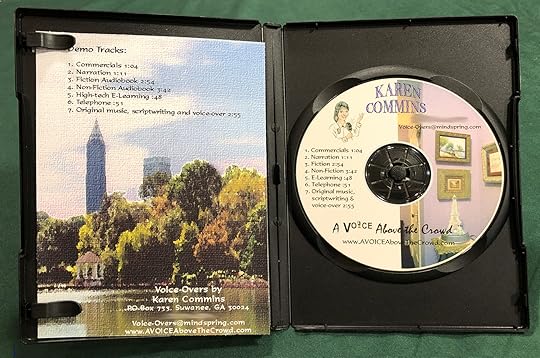
11) I’m naturally an organized person, but creating and using a central repository for ideas was a game changer.
12) Every passion shouldn’t necessarily lead to a career choice, but the ones that do can fill you with boundless joy and an incredible sense of accomplishment!
13) As a strong introvert, I have a lot of natural resistance to meeting new people. However, I’ve found some ways to feel more at ease in —and even enjoy — those situations.
14) Stop the comparisons! It is the most self-defeating, self-negating behavior many of us have. I strive to be like Mel Fisher and maintain NOW thinking.
15) Every moment has meaning, so I decided to not only be grateful for the day job, but look for ways to actually find happiness when I hated that job.
16) One of the most exciting days in my life yielded 10 observations about marketing in a crowded marketplace.
17) I always look to see how other situations can apply to me and my business. I’ve drawn parallels and discovered secrets to success from my hair stylist, a tree service, our surfing instructor in Hawaii, movies like this one and this one, a TV show, and even during my time in swimming laps at the gym pool.
18) Acceptance of my life was the key to being in the flow. I don’t have to force things to happen. They will occur when the time is right.
19) The majority of audiobooks posted on ACX.com have royalty share contracts. I look for certain criteria before accepting one.
20) Helping other people achieve their dream has greatly helped me get even closer to fulfilling my own. I’m so very grateful for and humbled by all your kind comments here, on social media, and in person about how my articles and Facebook responses have helped you.
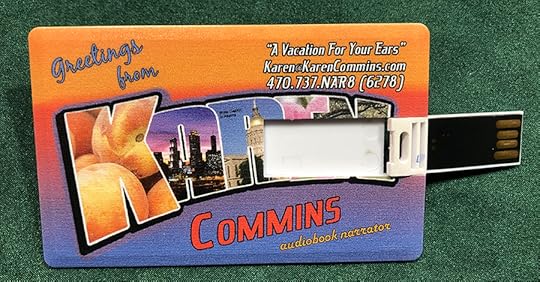
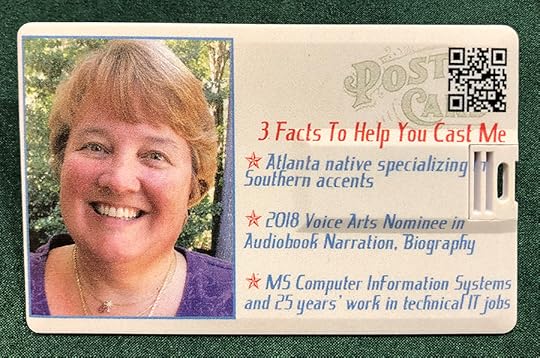
I feel like I’m barely scratching the surface with this list! Check out my blog archives for even more lessons learned!
Now that I’m heading into my 21st year of my business, it’s fitting that I’m stepping into an exciting new level of my destiny! My new site NarratorsRoadmap.com will be unveiled this month. Whether you dream of becoming an audiobook narrator or already are one, this site will be THE designation for narrators of all levels! Sign up for email updates or follow me and/or NarratorsRoadmap on Twitter to be alerted about the grand opening!
The post 20 Things Learned in Last 20 Years appeared first on Karen Commins.
August 27, 2019
How I Use My Journal
Earlier this week, I re-tweeted a great comment from casting director Dana Bowling:
Since several people asked me about my journaling process, I thought this post with a few ideas might help you start or further your own.
In short, there are no rules to keeping a journal.
Dana Bowling listed some meaningful journaling prompts in this follow-up tweet.
I’ve shared a number of journal entries on my blog (mostly 10 years older than the article date) and added some take-always. You can read them in the This Date in My History category. You might want to start in reverse order.
I also added journal entries in this post. I often add pictures and ephemera as in this example.
Lots of people are following the Bullet Journal method. I started journaling long before Bullet Journaling became a thing.
I prefer to follow Jim Rohn’s wealth of examples and instructions in his fantastic audio program How to Use a Journal. Here are a few of his golden nuggets from my copious notes when listening to that program:
If an idea is worth reading, worth listening to, worth remembering, then it is also worth capturing in your journal.
A journal is a textbook of self discovery and self-awareness.
When you have written about what your eyes have seen and what your ears have heard, go one step further and describe your feelings. Capture the joy of your victories and agony of your defeats.
Whatever you create on paper in your journal, you can, with enough belief, discipline, commitment, and desire create in your life.
For a while, I kept a physical planner/idea repository, which I have since moved to Evernote. My ideas and necessary information used to be scattered in different apps and in my journals. It was a game-changer to start saving everything in a central on-line depository so it’s accessible anywhere using any device. Since most of my journal entries are too personal to put on-line, I often take a picture in Evernote of my hand-written journal entries that I want to refer to often or repurpose in another form.
You add what you want to your book in whichever way you want. You can simply write, or you can do anything your creativity calls you to do. In addition to the entries I write almost every day (which includes a gratitude list of at least 5 things), I’ve copied quotes, affixed business cards and stickers, drawn pictures, and created collages in mine, like this one I shared in my June 2019 newsletter:
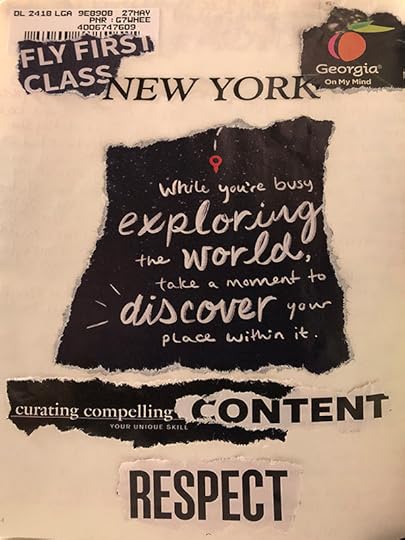
The daily practice of journaling offers a bounty of benefits, including:
improving your communication skills
magnifying your excitement and diminishing your fears
relieving stress
keeping you on track
allowing you time for self-reflection
visualizing your future
Do you keep a journal, or are you about to start one? I’d love to get your take on it in the comments!
The post How I Use My Journal appeared first on Karen Commins.
May 28, 2019
Inspiration On the Path Toward Achievement
Since I haven’t posted an article in over 6 months (gasp!), you might think my blog went into hibernation and never came out. However, I’m busy creating content that remains unseen to my audience.
First, I have several articles in progress for this blog to aid narrators with research.
I’m also writing a series of articles for my author blog. I’m basing them on the presentation I gave to the Atlanta Sisters in Crime chapter about the stages of audiobook production. I provided members with this rack card to plan their trip to Audiobook World. I recorded and transcribed my talk to re-purpose the info into a format I could share on my site. The articles relate to the stops on the map. I wanted to write all of these articles before I posted them so I could schedule them to publish on consecutive weeks.
Beyond developing stories for my blogs, I’m excited to tell you I recently launched a new site NarratorsRoadmap.com. This site will expand my work to help narrators of all levels. I’m gratified by the enormous positive reaction of the narrator community to this endeavor!
Currently, NarratorsRoadmap.com contains loads of terrific information and resources from a number of pros about getting started as an audiobook narrator. I’m working with Voice Actor Websites, a wonderfully creative and highly responsive team, on the design and implementation of the full site. Meanwhile, I’m creating the content. I hope you’ll sign up for updates! The first one will go out soon to give everyone the preview of coming attractions. (This tweet is a hint!)
Starting today, Tuesday 28 May at 10:00am and concurrent with this article, I will post quick tips on my Twitter account. I’ll write my #TuesdayTips on a postcard, naturally, and they’ll cover a range of subjects, from online safety to software usage to marketing tactics.
Even though I am a full-time empress of information, I continue to narrate books! If I don’t have an assignment from a publisher, I create my own projects. I’m prepping a comprehensive biography about Mary Todd Lincoln.
I wanted to share these activities with you to illustrate that just because we don’t see things happening, or our desires aren’t manifesting on our timetable, we shouldn’t give in to discouragement. Hidden forces are moving conditions around in our favor!
Here here are 4 quotes that sustain and inspire me while I’m on the path toward unlocking the next achievement. I hope you find them helpful, too.
Johann Goethe is usually credited with these lines, but the Quote Investigator site notes they should be attributed to Irish poet John Antser:
What you can do, or dream you can, begin it,
Boldness has genius, power, and magic in it.
I recently read the transcript of Tim Harford’s TED Talk titled “A Powerful way to unleash your creativity.” The path to the success you seek can be a meandering line among many projects.
I would like to urge you to embrace the art of slow-motion multitasking. Not because you’re in a hurry, but because you’re in no hurry at all…If you have another exciting, challenging project to work on, being stuck on one is just an opportunity to do something else.
Joanna Gaines, TV star of home improvement shows, wrote in her and her husband Chip’s book The Magnolia Story that you must thrive BEFORE you can get to the next career rung which garners more attention and increased influence.
Most people think that you start off not thriving. Then you get a TV show or some other amazing opportunity, you get fame, you get fortune, and then you thrive. That’s certainly what I thought earlier in my own life. But what’s interesting to me is that Chip and I got to a place where we were thriving — as a couple, as a family, as business partners — before any of this new success unfolded.
When I catch myself making those unproductive and soul-stealing comparisons , I start thinking about this quote from Joel Osteen:
I read where an elephant is pregnant for two years. Because the animal is so big, it takes more time for that baby elephant to grow and develop…People around you may be giving birth. They’re seeing their dreams come to pass. Be happy for them. But the reason it’s taking longer for you is because, like that elephant, what you’re carrying is not ordinary. It’s not average. What you’re going to give birth to is going to be bigger, more rewarding, more fulfilling than you’ve ever dreamed. Don’t get discouraged by the process.
Do you have a favorite quote to help you stay inspired and motivated? I’d love for you to share it in the comments!
The post Inspiration On the Path Toward Achievement appeared first on Karen Commins.
December 12, 2018
Analyzing the Audiobook Narrator Self-Assessment Quiz Part 4
It’s finally here! Settle in for the 4th and final article about analyzing the questions on my Audiobook Narrator Self-Assessment Quiz. If you’ve missed the previous posts in this series, check out Part 1, Part 2, and Part 3.

This time, we’ll talk about the Financial Considerations section of the Quiz. I was taught to never discuss money in a job interview until you know you are a good fit for the position. I saved this section until the end for the same reason.
What are your financial expectations?
While it’s true that your earnings potential as a narrator rests in part with your drive and determination, it’s also true that most new narrators don’t make enough money to live off their narration business for an undetermined number of years.
Audiobooks are paid per finished hour (PFH). If your rate is $200 PFH, you would earn $2,000 for a book that runs 10 hours. However, your actual time spent in recording the book will be longer than 10 hours. Refer to this article for a more in-depth explanation about the time needed to produce an audiobook and this one for info about computing your per finished hour rate. Just because you’re new doesn’t mean you should accept rates below $100 PFH. When you figure your real-time hourly rate, you shouldn’t discover you’re charging minimum wage or lower.
In order to gain the attention of authors and publishers who actually have decent budgets — particularly those with SAG/AFTRA agreements (note that union membership qualifies you for other benefits such as health insurance) — you first need to develop a portfolio of solid titles, by which I mean you should record books in popular genres that have finished times of at least 6-8 hours. You may choose to take some projects on a royalty share (RS) contract in order to gain experience. I wrote extensive articles about RS projects here and here.
In addition to possibly taking low-paying and/or speculative work at the start of your career, you should assess what you’re willing to sacrifice in order to pursue this work. I know people who worked a day job, narrated in their off hours, and only slept 3-4 hours for several years. They didn’t leave the day job until their narration income could fully support them.
I’m not saying you have to follow suit. Instead, you must realize that your progress probably will be slower than you would like or hope.
If it were easy, everybody would do it.
Have you ever worked as a freelancer?
I probably should have asked this question first! If you’re used to a steady paycheck and benefits like paid sick days, you may be in for a major shock when you become a freelancer.
You can do a Google search and find numerous articles outlining the advantages and disadvantages of being a freelancer. I’ll point out a few of the downsides:
Your workload is uncertain and often can be a feast or famine situation. Many narrators say yes to every project and risk their health because they want to ensure they have money even during the worst dry spells for work. In those cases, personal and/or vacation time often gets pre-empted by a must-do book.
Some people can’t tolerate the uncertainty about payment and therefore always work at least one other job to maintain their lifestyle.
Without the guarantee of money coming in, you may start doing work like lawn or house care that you previously hired another person to do. You also are responsible for all aspects of running your business, including invoicing the clients and making timely tax payments to the IRS.
Health care costs, including insurance premiums, continue to rise.
Be sure you’re fully aware of the pros and cons to this type of work before you commit to it as your sole job.
Do you have a day job or other monetary cushion to see you through slow times?
Most people starting as audiobook narrators do so on a part-time basis. While a day job limits your availability, it also frees you of the stress and pressure to show an immediate profit while providing other benefits to you. Retirees from other fields who are drawing an annuity also tend to have an easier time starting a second career as an audiobook narrator.
Even the most successful, highly lauded, experienced narrators occasionally have periods of weeks or even months where they don’t have work. It’s important to always have contingency and emergency funding sources.
Do you have money set aside for start-up and on-going business costs?
Audiobook narration is a BUSINESS. Like any business, it has start-up and on-going costs, including equipment, software, coaching, internet connection, web site, and marketing materials.
If you don’t have enough money on-hand for your business expenses, whether now or in the future, I encourage you to do the empowering exercise described in this article.
How do you feel about constantly networking and marketing yourself to attract and retain clients?
Narrating a book is the reward for doing the REAL job — regularly informing those who could hire you of your talent, abilities, and availability.
How would you make yourself stand out and be memorable in an already crowded marketplace? Sending email after email may not gain any traction, especially when you’re new to the industry. As I wrote in the last article, publishers hire you only after they decide they can trust you.
One of the surest ways to help people to learn to trust you is to meet them in person. People who live in and around NYC and LA have an advantage in getting to industry events as most of the big audiobook production facilities are located in those 2 cities. The rest of us travel to other cities for conferences, mixers, and workshops. I recommend that you join the Audio Publishers Association to be alerted about member events across the USA.
Obviously, you also should be alert to events occurring in your city. For instance, the American Library Association holds twice-yearly conferences in different cities. Audiobook publishers and producers attend those conferences, so you might be able to connect with your prospects there.
When doing auditions, don’t expect to hear back from the casting person unless you get the job. TV star Bryan Cranston perfectly and succinctly explains this point in this 1:22 video.
Do you have or can you make a dedicated recording space in your home?
You need a dead-quiet space to record a pristine audiobook. Sound isolation and sound proofing materials can be expensive. You may also need to pay for consultations with studio and other technical advisors who can help you achieve an optimum sound for your space.
If you don’t have such a space available, you would need to rent studio time and pay an engineer for actual, not finished, hours to record the project. You would need to get rates in your local area in order to create a budget.
Now that we’ve examined the factors in becoming a successful audiobook narrator, what are your thoughts? Did the quiz help you decide whether to pursue audiobook narration as a career? Did the quiz raise more questions for you? I’d love to hear from you in a comment below!
The post Analyzing the Audiobook Narrator Self-Assessment Quiz Part 4 appeared first on Karen Commins.
December 5, 2018
Analyzing the Audiobook Narrator Self-Assessment Quiz Part 3
We’re halfway through with the questions on my Audiobook Narrator Self-Assessment Quiz! To catch up, start with Analyzing the Audiobook Narrator Self-Assessment Quiz Part 1.

Continuing where I left off in part 2 , we’ll discuss the last 7 of the 15 questions in the Personality/Work Habits section.
How would you rate your comfort and skill levels with working with technology more complicated than your phone?
Not too many years ago, all audiobook narrators went to recording studios and were only responsible for performing the text of the book. An engineer ran the computer controls, and a director helped the narrator shape the performance. Those same narrators might have done auditions from a home studio, but they recorded the full book in a commercial studio.
Due to changes in technology, more and more narrators must record the complete project in their own studio. Most narrators who work in a home/private studio don’t have the luxury of employing an engineer and director. Instead, the narrator wears all 3 hats simultaneously.
Recording your voice looks very different on the screen than writing an email. You will use a Digital Audio Workstation (DAW) like Pro Tools, Audition, or Twisted Wave to record and edit your voice in a WAV file, which is the graphical representation of the raw, uncompressed sounds.
Teddy Roosevelt said, “Do what you can, where you are, with what you have.” Your first studio may be a simple set-up of a computer and good microphone. However, you still must be able to research the hardware and software that you need to get and learn how the pieces work separately and together. You’d also need to set up a dead-quiet recording space in order to create the type of audio expected by publishers and listeners.
Once the narrator completes the recording, she must be able to submit files that A) conform to a publisher’s specifications and B) use the publisher’s choice of delivery methods. No one asks you to copy files to CD any more. They will tell you the format of file to submit (WAV, MP3, FLAC) and whether to use a commercial FTP service like WeTransfer or connect to their server using your own FTP software. They may instead ask you to upload files to Dropbox or another site.
They will not tell you HOW to do any of those things. They expect that you either already know or will spend the time and energy to learn.
If the high-level description and quantity of acronyms in this section make your eyes glaze over or cause you to feel nervous or apprehensive, take a deep breath and relax. Other people have learned all of these terms and skills, and you can, too. Realize, though, that you may need to take some computer classes and/or pay consultants to help you create an ideal recording environment and absorb all you need to know to use it with ease.
How does the thought of learning new software make you feel?
I’ve talked with many people who dread learning software and are afraid of making a mistake that will erase all of their work and damage their machine. Some leave 15,000 emails in their in-box because they are afraid of deleting something they might need later or missing some piece of information.
Both of these scenarios stem from lack of knowledge and confidence. The more you learn about your software and hardware, the more confidence, ease, and productivity you will have in using them.
As I pointed out in this article, a lot of software operations are transferrable skills. Understanding and becoming proficient with DAW processes seems to give most people the greatest difficulty. If you are struggling to learn your DAW, 1 or more of the training options I shared in this post may benefit you.
How would you rate your communications and customer service skills?
Even before I specifically talk about marketing and networking in the upcoming final article of this series, I want to point out that good communications and a customer service attitude are at the heart of this job.
Narrators pleasantly and persistently contact and follow up with people who can hire us without overdoing it and becoming a pest.
Publishers hire you only after they TRUST you. You must be reliable and a person of your word. Once hired, if you run into any issue that jeopardizes meeting your deadline, you must immediately inform the publisher.
However, you also must be able to help audio rights holders who are new to audiobooks understand the production process as well as industry best practices. For instance, an author may expect you to do something like sing copyrighted song lyrics that the author included in the text, add background music to certain scenes, etc. In such cases, the customer is NOT always right! You must be able to use a firm, professional, non-argumentative tone to advise the rights holder of the industry position.
How do you feel when you need to research something?
Mispronounced words are a sure way to annoy listeners and cause them to temporarily lose their focus in the audiobook. You need to say city, street, and business names the way people in the local area say them. For instance, one narrator I know received numerous complaints for mispronouncing Houston St. in New York City. Go ahead and research that one to see what I mean.
You’ll find that most books require the narrator to research some pronunciations of proper names for people, places, and products. Non-fiction books particularly demand rigorous research; here’s an example showing my research for ROAD TO TARA: THE LIFE OF MARGARET MITCHELL by Anne Edwards. You may be able to find sources on-line, or you may need to dig further and actually call people to ask for pronunciations. You may need to check multiple sources. You’ll want to document your findings to share with the proofer and publisher.
Are you able to concentrate on one task for long periods?
Kids and other people in your house, social media, clients, the doorbell, lawnmowers and weed eaters in your neighbor’s yard — an endless number and variety of possible distractions await the audiobook narrator each and every day. When you’re in the booth, you need to put the rest of your life on hold.
You have to get your mind in a good place before you walk in your booth so that you’re totally focused on the story at hand. All sorts of things could be running through your mind, even something simple like, “Oh, I need to make my grocery list.” If you’re upset about something, you need to get that out of your system before you come in front of the microphone. You have to put all of that aside so that you are totally and completely focused on the story in front of you. That’s the only way that you can give justice to the author’s words — to be so immersed in their story that you can tune out the rest of the world.
Remember, the listener is right there. You are literally in their ear when they listen to your narration. They will be able to hear when a narrator is disconnected from the story.
Are you patient?
I see too many people entering a narration career with the false expectation of quickly earning enough money to make narration their sole source of income. The people on top of the mountain didn’t just land there. People who are viewed as overnight successes usually have been working diligently for years or even decades before attaining public recognition.
It takes time to develop a narration style, gain the trust of 1 or more publishers, and build a client list and a thriving business. You also need to be patient with yourself as you gain knowledge about the industry and learn new competencies. A while back, I wrote about 12 lessons from a popular TV show that further explains the many ways you’ll need to exhibit patience.
Are you a perfectionist?
If you proudly proclaimed your perfectionism, you might have done so thinking it would be a valued trait. However, as Voltaire wrote, “the best is the enemy of the good.”
You could labor over each sentence in a paragraph doing retake after retake until you get that sentence JUST RIGHT. Paragraphs recorded this way could end up sounding stilted and forced. Instead, we want the words to flow with energy and be naturally connected to each other.
Perfect is also the enemy of the DONE. You could make any project into life’s work. After having a proof listener go through the completed audiobook and then re-recording any parts of the text that they point out for correction, you need to have the confidence in your art to meet or beat your deadline and release it to the world.
In my upcoming final segment to analyze answers to my Narrator Self-Assessment Quiz, we’ll discuss the nitty and the gritty financial considerations. In the meantime, are you writing things down? Have you discovered anything about yourself that makes you reconsider your desire to become a narrator? Please leave me a comment with your feedback!
The post Analyzing the Audiobook Narrator Self-Assessment Quiz Part 3 appeared first on Karen Commins.
November 8, 2018
ACX U – Acting With Intention
Most of this blog’s readers know about the audiobook production site ACX.com. Each year, ACX produces educational programming called ACX University. I had the great pleasure of being a guest speaker on the topic of Acting With Intention in one of the 2018 ACX University sessions.
During and after the video broadcast, I chatted with viewers. As usual for the Queen of Links, I shared a number of resources in that chat session. I also answered a number of questions.
While the chat is embedded with the video, I wanted to post all of the ancillary material and discussion here on my blog to make it easier to reference. That way, you can watch the video and not worry about missing anything.
Links to resources I mentioned in the video with time stamps:
3:51 My article outlining 10 questions to ask coaches and demo producers I would also refer you to a more recent article Is This Coach Right For Me?
7:51 Audio Publishers Association
9:36 Sisters in Crime
10:36 Barbara Sher’s fabulous book Wishcraft
12:04 Facebook groups for narrators:
Audiobook Crowd
Indie (ACX and Others) Narrators and Producers Facebook group I referred to it as the ACX group in the video. After you join the Indie/ACX FB group, be sure the check the extensive group FAQ , which I created and maintain.
Narrating Audio Books from the Public Domain
Professional Audiobook Narrators is not visible to the general public. A current member must add you, and you must have done 10+ books to be approved.
Findaway Voices Narrators I didn’t name it in the video, but you’ll want to join it if you narrate for Findaway Voices.
13:18 C. J. Hayden’s Get Clients Now! book
13:43 C. J. Hayden’s Business Building Writing workshop
14:23 Krista Tippett’s “On Being” interview with Seth Godin
Other links I shared in the chat:
I send newcomers to audiobook narration to this article.
Someone in the chat mentioned being an introvert. I replied that lots of narrators are introverts, including me! Here’s an article of 3 networking tips for introverts. I still smile at the graphic I created for that post!
Links on ACX:
My articles on the ACX blog:
How to Act Like an Audiobook Narrator
A Narrator’s Look at Audiobook Marketing – Part One
A Narrator’s Look at Audiobook Marketing – Part Two
ACX U Chat Questions and Answers
Rather than merely copying the questions and answers in the order they appeared, I’m going to resequence them and group related questions together to make them more organized and digestible. Of course, I’ll add links to this info as well, which is another bonus of viewing it here instead of in the chat window.
Q: When you started, did you start with shorter auditions? Or just plunge into what you were interested in?
A: The AUDITION is short, no more than 5 minutes, but the BOOK never was. Starting with a short book seems intuitive but really is counter-productive long term. Many ACX producers take short books to get their feet wet, and usually those books don’t look good in their portfolio 7 years later. I would say to start with REAL books like mysteries, romances, etc. no matter the length.
Q: How detailed do you get with your notes for intention/feeling? Do you evaluate by chapter only, or do you get as detailed as marking each paragraph with an intention or feeling?
A: I used to mark up my texts in different colors for every line of dialogue but now find that too distracting. I underline dialogue tags that describe the emotion, like “she said angrily”. I might write a quick description of the emotion in a scene, or something about the subtext to remember, but usually I remember the emotions from my prep.
Q: So, you’ve trained your eyes to see the underlined dialogue tag, even if it comes later than the dialogue?
A: Yes, for the most part, but I do underline some tags during prep.
Q: Do you self-direct or always have a separate director?
A: I’m blessed that my husband Drew directs all of my performances and even most of my auditions. If I didn’t have him, I’d team up with another narrator to direct each other. Having a 2nd set of ears hearing everything and someone to discuss the text with makes the performance more accurate and emotionally rich!
Q: What was the self-directing game changer for you? Could be a technique or a moment where things really clicked and you could see a noticeable change in your narration.
A: Paul Ruben’s narrator workshop was a game changer. He pushes you to be more emotionally invested in each and every word from the author — what he calls “upping the stakes”. He also teaches you to mine the subtext for your approach to the performance. You make think you’re going overboard on the emotion, but may not come across that way to the listener.
Q: Do you ever have a concern of coming across as “hammy” in a performance? And how do you assess that?
A: No, I don’t have that concern because I view fictional characters as real people and act them that way. You can’t just “do a voice” for a character. That’s when it starts to sound like a caricature.
Q: What do you mean by “you can’t just ‘do a voice’ for a character”? Do you mean that can’t be the only thing you do to differentiate that character’s personality?
A: Doing a voice” is different than “being a character”. So many things in the text will tell you about the character’s personality that it helps you shape their voice, rhythm, speech.
Q: What is your process for maintaining consistency of characters over the reading process?
In my prep, I figure out who the character is. I wrote a post on the ACX blog discussing that process. [See section 2 of this article.] While recording, I make and save WAV files of each character.
Q: Why save WAV files instead of just saving in the native format of the app, e.g., Audacity project files?
A: If it’s a WAV, I don’t have to stop one project and load another to hear a voice match.
Q: During 3rd person narrations of a book, how much emotion or “character” do you assign to those portions?
A: YES!! In fact, the 3rd person narrator definitely has a point of view and is often in everyone’s mind (for fiction). You can really mine the subtext for characters’ emotions for a nuanced performance.
Q: Have you done any Non-Fiction books? If so, how is your approach different?
A: Yes, I LOVE non-fiction books! In fact, ROAD TO TARA: THE LIFE OF MARGARET MITCHELL by Anne Edwards is nominated for a Voice Arts Award in Audiobook Biography! Non-fiction still requires ACTING and being emotionally committed to the author’s words. In many ways, it’s more difficult than fiction because you have to speak with the author’s knowledge and confidence. Plus, non-fic books often require lots of pronunciation research. My approach is pretty much the same for any book — you have to emotionally connect.
Q: We have been having a bit of a back and forth re: nonfiction reads. Do you read the whole book beforehand in nonfiction like you must to in fiction?
A: PRE-READ THE WHOLE BOOK EVERY TIME. No exceptions. If you don’t know where the author is taking you, regardless of fiction/non-fic, how could you possibly expect to take the listener along with you?
Q: When you find your focus straying, what do you do to stay focused on the narration?
A: I usually take a quick break out of the booth. If something’s bothering me, I might write it down in my journal. If it’s summer and thoughts of being in the pool keep me unfocused on my work, I get in the pool!
Q: Are certain times of the day better for your voice for recording? Like, more energy in the morning?
A: Vocal energy and resonance depends on each person and things like your previous night’s sleep, hydration, stress, etc. I hope everyone knows they shouldn’t scream at concerts (sorry Barry Manilow!)
Q: The dullest of geeky questions – what mic do you generally use for audiobooks?
A: It’s not dull, and I worked a career in IT, so I’m a geek, too! I have only had 1 mic throughout my vo/narration career: a Neumann TLM 103.
Q: What’s inspiring you today? (This one and the next from AudibleACX as we wrapped up)
A: We just moved to a new house, so I’m being inspired by seeing boxes getting unpacked and art hung on the walls! The studio was the first thing we did and looks gorgeous!
Q: We definitely need pics!
A: Absolutely! We ran out of time during my session, so I didn’t post these photos in the chat. I’m delighted to share them here.
Labor Day weekend 2005 was the first time we assembled my WhisperRoom. We spent Labor Day weekend 2018 in WhisperRoom assembly, take 2!
The booth has over 40 pieces and weighs over a ton once assembled. Drew did all of the disassembly at our previous house and reassembly in the new one, with only minor help from me: steadying pieces while he screwed bolts, and lifting the ceiling panels into place. We had the moving crew transport the disassembled WhisperRoom when they moved our furniture.
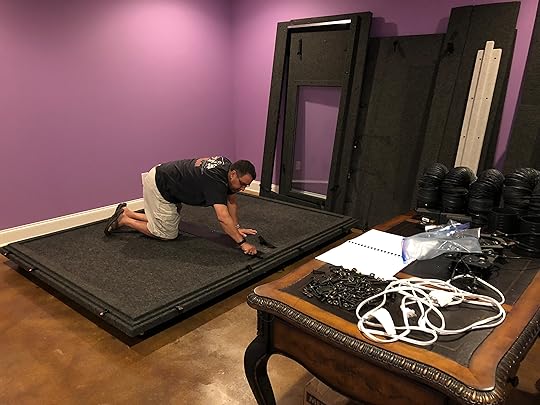
In the above picture, Drew joins the 2 floor panels on top of the base on casters. We left the casters on the frame during the move. The photo below shows him putting the last screws in the ceiling about 4.5 hours later.
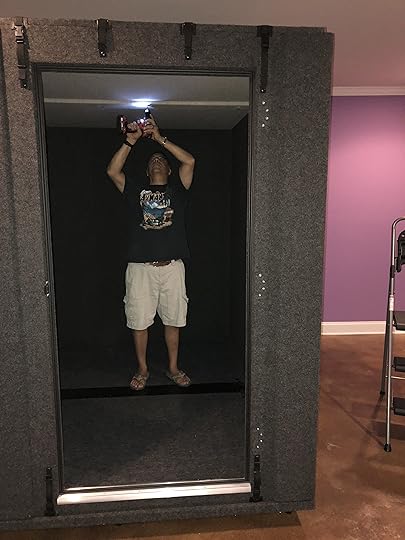
Here’s a pano shot of the new studio! I’m in the booth. My executive producer Yogi is facing Drew, who stopped directing to take this picture.
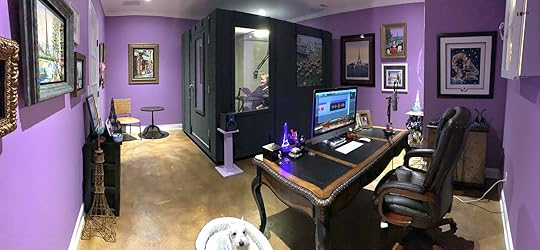
The post ACX U – Acting With Intention appeared first on Karen Commins.
November 5, 2018
Analyzing the Audiobook Narrator Self-Assessment Quiz Part 2

After I published my last article, Drew and I moved to a new house! We had lived in our other house for 30 years, so it took 6 weeks to get everything relocated from there to here. We’re STILL unpacking and hanging artwork in between our other activities, including actually doing some work!
Like finding the right place to live and physically moving in, choosing the right career — even if it’s a career change — should start with significant self-reflection about the way you want to structure your life, the activities you enjoy, and your skills. I think most people spend more time planning their vacations than they do in planning their lives!
Many people think they want to become an audiobook narrator until they realize that being successful in this career entails a large number of skills and personality traits they may not have considered. I therefore created my Audiobook Narrator Self-Assessment Quiz.
In the first article about analyzing your answers, I explained the rationale behind the questions in the Baseline and Language sections.
Today, we’ll look at the first 8 of the 15 questions in the Personality/Work Habits section.
Do you like to work independently or with other people?
Most narrators work in their home studios without aid from anyone like a director or engineer. As a result, some people report that the isolation and solitary nature of the job wears on them.
However, others say that they feel they need to be around other creative people to maintain their energy. If you fall in this category, you may want to consider renting an office for your booth.
The newer narrator you are, the more you need coaching and directorial guidance to shape your performance. I recommend that you book time with one or more reputable coaches before starting your first projects.
Are you a self-starter?
When I switched from part-time to full-time work at the IRS, I was surprised that they rang a bell at the start and end of each work day. I already was accustomed to the regimented and precise 15-minute break times. Full-time employees also had a 30-minute lunch period. You didn’t go a minute early or stay a minute late during either break or lunch. Any personal business must be attended during those times or off hours.
As an audiobook narrator, you have complete freedom in setting your schedule. No one will be looking over your shoulder telling you when to start or stop work or ensuring that you even perform any work. You don’t fill out time sheets or submit your accomplishments to anyone. Best of all, no one will hound you about the dreaded TPS reports!
Producers and publishers want to work with people they can trust. You prove your value to your clients by being efficient, maintaining communication, and completing quality work within your deadline. You must determine how much time is needed to prep and narrate your book and plan your days around getting it done.
Do you consider yourself organized?
Organizational skills extend beyond the number of papers — or stacks of papers — on your desk. A narrator must manage the project from beginning to end.
Your computer files need to be orderly so that you can quickly and easily find and load the project recordings when you receive corrections. You’ll need to know when, to whom, and for what amount to submit invoices and follow up if payments are late.
Being organized for success includes having the necessary materials to attract clients, especially a well-functioning web site with demos that are labeled and immediately clickable. As somewhat of a tangent about being organized, I also suggest that you have an email address with your own domain as it looks more professional than a free account.
I could write an entire article about organization. Wait. I already did! This article offers lots of ideas and resources related to 3 main areas of organization that would be useful regardless of your career.
Are you detail-oriented?
Attention to detail goes hand in hand with organization. In addition to sometimes extensive pronunciation research on individual projects, which I’ll address in the next article in this series, you ALWAYS need to pay close attention to the recording specifications and file naming conventions provided by each publisher or distributor. Detail-oriented people also log every communication with prospects and clients in order to build and maintain relationships and improve their results.
You need to maintain consistency of character voices across the book or even a series. A large part of your prep for a book is learning about the characters. I described my process and gave an example in the “Take Notes” section of this article.
During the recording sessions, my director makes WAV files of each voice and stores them in a folder for a project. Since they are WAVs, I don’t have to spend time to find and load a different project file in order to hear a character’s voice. This practice becomes even more useful for books in a series as quite some time may pass in between book releases.
When you receive corrections from a proof listener, you’ll want to listen to the original recording in order to match your voice before re-recording the line. Such re-recorded segments, known as “pick-ups”, must be inserted seamlessly into the original recording. Our goal is for listeners to feel like we told the story in one sitting.
Are you adept at time and project management?
If the narrator is also the producer, as is the case on ACX.com, you’re responsible for hiring, scheduling, and paying editors and proof listeners. Once you become established, you could be doing the prep for one book, recording another, and re-recording corrections on a third. Of course, you have other things going on in your life that must be planned and scheduled concurrently with your work.
Are you thick-skinned when it comes to criticism?
As a performance artist, you can’t escape criticism. Audible listeners often hide behind a pseudonym and leave soul-destroying comments about your narration or even you as a person. Professional reviewers will point out flaws in your vocal abilities and acting choices. I therefore encourage you to read my article How Do You Respond to Criticism? for more information and thoughts about coping with the negativity in reviews.
Are you curious? Do you like to learn new things?
I think that if you don’t learn something new almost every day, you might as well be dead. Aside from that mindset, though, I added this question because of the research involved in narration. Fiction books often require a narrator to learn the flavor of an accent in order to portray a character. With a non-fiction book, you need to sound like you know what you’re talking about because you are standing in for the author who is indeed an expert. In either case, getting up to speed quickly will be easier for those who are innately curious.
However, research can easily send narrators exploring one rabbit hole after another. Did I mention you need to be good at time management?
Aside from the research, the best narrators are constantly looking for ways to improve our performances and work flow. We listen to audiobooks, talk with other narrators, get coaching, read articles, and experiment with everything from software usage to mic technique.
How do you deal with constant rejection or perhaps even feeling ignored?
Some new narrators who audition on ACX think the rights holder casting the title should let them know whether they listened to the audition. These same narrators also want feedback about their performance. Experienced pros, on the other hand, know that you do the best you can in the audition, submit it and FORGET it. Actor Bryan Cranston gives the best advice about the actor’s job in the audition process in this 1:22 video.
Beyond auditions, you can expect that you may not receive a response for weeks, months, or ever, no matter how persistent and consistent you are in marketing yourself to prospects. Your goal is to stay in touch frequently enough that you pleasantly stay on the radar of producers and publishers without being perceived as a nuisance. If you need constant strokes of praise and/or can’t live with the uncertainty about your next contract, you will not enjoy being an audiobook narrator.
We’re halfway through this section and will get to the remaining 7 questions in an upcoming article. In the meantime, are you writing things down? To further encourage you to spend time writing answers to the quiz and thinking in depth about how you want your life to be, I will send a special journal to the first 5 people who leave a meaningful comment on this post! I’d love to know your thoughts about the quiz, and, if you’d care to share, any revelations you’ve had after taking it.
The post Analyzing the Audiobook Narrator Self-Assessment Quiz Part 2 appeared first on Karen Commins.
August 15, 2018
Analyzing the Audiobook Narrator Self-Assessment Quiz Part 1
Last week, I presented my Audiobook Narrator Self-Assessment Quiz. Today, we’ll look at the rationale behind the Baseline and Language questions. Note that these questions don’t have right or wrong answers.

Baseline Skills
Have you ever heard the sound of your recorded voice?
I asked this question because many people have never heard a recording of their voice. When they do hear it, they don’t think it sounds like them.
Listening to your own voice can help you identify areas where you need improvement. For instance, your diction may sound sloppy and even make words unintelligible to the listener. Remember, the listener won’t have the benefit of the text or your facial clues in deciphering your speech. If you sound raspy, you may need to drink more water and stay better hydrated. Actually, it’s a good practice to drink lots of water each day so that you are always prepared to record!
Once people get used to the sound of their recorded voice, they can fall in love with it. It’s a mistake to listen too much to yourself in your headphones as you record. The goal in audiobook narration is to make the author’s words shine, not our own voices. If you or listeners are paying attention to your vocal mechanics, you and they will not be able to maintain interest in the story.
Have you ever read aloud?
We read things in our minds differently than we do out loud. In fact, we often skim texts and skip over words entirely. Audiobook narrators must read each and every word on the page with the appropriate inflection in the order they are written without adding, subtracting, or transposing them while maintaining any character voices and exhibiting the emotion found in the text and sub-text. If we make a mistake, we must stop and re-start the recording so we can say it again.
Narration requires vocal stamina that most people don’t automatically have. You’d think it would be as easy as talking, but you need to strengthen the larynx muscles by practicing reading aloud. You may also want to do specific exercises to improve the quality of your speech.
Do you enjoy telling stories?
We tend to think of born storytellers as those who attract people with their every utterance. It’s one thing to rely on one’s personal charm and tell a short, funny joke. It’s another thing entirely to read someone else’s words and communicate that author’s intent to the listener.
You may have been told that you have a nice voice. One’s voice is NOT the most important part of becoming a narrator! Every word the author wrote has meaning, and the narrator must understand and be fully engaged with the text to deliver its meaning and realize the author’s vision. You wouldn’t read an adult non-fiction book in the same manner as a children’s fairy tale. Knowing how to change your tone to match the genre and emotion of the text is a key part of telling an author’s story.
Do you have training or experience in acting or oral interpretation?
Acting and oral interpretation classes, and certainly Toastmasters, focus on giving speeches or performing in front of an audience. A narrator needs acting skills to connect to and convey the emotional content of the book. However, audiobook narration does not depend on stage directions, other actors, or the audience reaction. It’s an intimate medium. You’re right in the listener’s ear, so you need to be able to adjust your volume downward while continuing to use your full range.
I recommend all newcomers to train with one or more vetted audiobook coaches on this spreadsheet to learn performance skills necessary to become a successful narrator.
Language Skills
Do you love language?
Most narrators I know delight in words. We love awesome alliterations, evocative descriptions, and clever metaphors. I’ve noticed that a large number of narrators not only enjoyed our English classes in school, but we’re well-versed in grammar rules.
Often, though, the books we narrate may be lacking interesting literary devices. What’s a narrator to do? A passage I heard when listening to the audiobook of The Time Traveler’s Wife by Audrey Niffenegger contains the secret. The lead character Henry had a father who was a 2nd chair violinist in the symphony. Henry described his father this way:
“He has this idea that every piece of music should be treated with respect, even if it isn’t something he likes much. I mean, he doesn’t like Tchaikovsky, or Strauss, but he will play them very seriously. That’s why he’s great; he plays everything as though he’s in love with it.”
By exercising the same love and respect for the language before us, a narrator can elevate even the most mundane writing into a thing of beauty. After all, language is meant to be spoken. Oral storytelling came long before written words.
What is your native language?
If your native language is not English, you may find it more difficult to get a foothold in the audiobook industry. Take heart! Each year, production continues to increase around the world.
Do you know more than 1 language? If so, how would you rate your proficiency in it?
Most casting directors and producers these days are looking for authentic native speakers for books. In addition, foreign words regularly appear in English texts. Some level of training or, better yet, fluency in 1 or more languages other than English could lead to your being cast for a book.
In my next article, I’ll talk about the personality and work habits section. In the meantime, I’d love to learn your thoughts about the quiz. Please leave a comment on the blog!
The post Analyzing the Audiobook Narrator Self-Assessment Quiz Part 1 appeared first on Karen Commins.
August 8, 2018
Audiobook Narrator Self-Assessment Quiz
A commenter on my article How to Become an Audiobook Narrator asked me:
I am told that I have a great talent in reading and acting…and for some time I’ve been thinking if I should start doing voice overs as an audio book narrator. What kind of skills do I need to acquire or improve on?
I could — and someday will — write an answer that addresses the part of the sentence that reads “I am told that…”. Today, though, I present my (drumroll)…
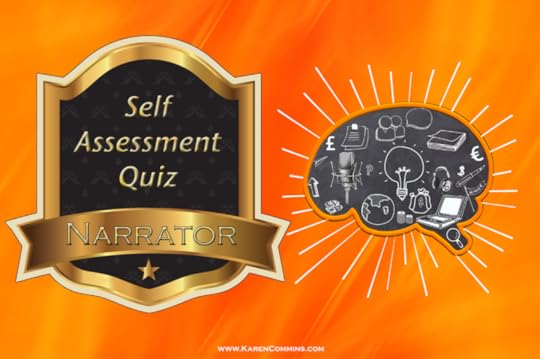
Audiobook Narrator Self-Assessment Quiz
If you’re thinking about a career in audiobook narration, answers to these questions will help you determine if you’re a good fit for this type of work.
Pre-requisites
Do you like to read?
If the answer is NO, stop taking the quiz, and start thinking of some other career option. Seriously.
Do you regularly listen to audiobooks?
If the answer is NO, listen to many more audiobooks in different genres to get a feel for the art form before you continue with the quiz. I’d suggest you’d get a subscription to AudioFile Magazine, which is the industry’s standard for professional reviews, and listen to audiobooks that earned Earphone Awards.
Baseline Skills
Have you ever heard the sound of your recorded voice?
Have you ever read aloud?
Do you enjoy telling stories?
Do you have training or experience in acting or oral interpretation?
Language Skills
Do you love language?
What is your native language?
Do you know more than 1 language? If so, how would you rate your proficiency in it?
Personality/Work Habits
Do you like to work independently or with other people?
Are you a self-starter?
Do you consider yourself organized?
Are you detail-oriented?
Are you adept at time and project management?
Are you thick-skinned when it comes to criticism?
Are you curious? Do you like to learn new things?
How do you deal with constant rejection or perhaps even feeling ignored?
How would you rate your comfort and skill levels with working with technology more complicated than your phone?
How does the thought of learning new software make you feel?
How would you rate your communications and customer service skills?
How do you feel when you need to research something?
Are you able to concentrate on one task for long periods?
Are you patient?
Are you a perfectionist?
Financial Considerations
What are your financial expectations?
Have you ever worked as a freelancer?
Do you have a day job or other monetary cushion to see you through slow times?
Do you have money set aside for start-up and on-going business costs?
How do you feel about constantly networking and marketing yourself to attract and retain clients?
Do you have or can you make a dedicated recording space in your home?
I’ll talk about the importance of each section and explain my thinking behind many of the questions in upcoming posts. For now, take some time to reflect on each question, and be sure to date and write down your answers! To encourage you to spend the time needed to reflect on these questions and write the answers, I’ve created this free, downloadable PDF of the quiz.
The post Audiobook Narrator Self-Assessment Quiz appeared first on Karen Commins.
July 8, 2018
Are QR Codes Still Used?
After poring over my Audiobook Marketing Cheat Sheet, an author recently asked me whether QR codes are still relevant and in use.
I responded that the answer to that question depends on who you ask. You’ll find compelling arguments on both sides, but the codes seem to be regaining their popularity.
Lifehacker reported in April that Apple iOS 11 and some Android phones can read QR codes natively, so you no longer need a special app to scan them. Presumably, Apple wouldn’t spend the time and cost to develop this feature if no one wanted to use it. You simply click on the smartphone camera app, point it at the code, and the operating system will scan and convert it for the browser.
This SocialMediaToday article, also from April, talks about Facebook rolling out QR codes for Pages and links to an article about the popularity of these codes in Japan and China.
I agree with the assertions in this article that QR codes continue to be good tools as long as you use them correctly — i.e., only on printed materials — and keep the linked content updated and optimized for mobile access.
I decided to post this article on my blog for narrators because I have a QR code on the back of my business card that links to my web site. This way, I can hand out my business card to someone, and they can instantly connect to and HEAR my demos.

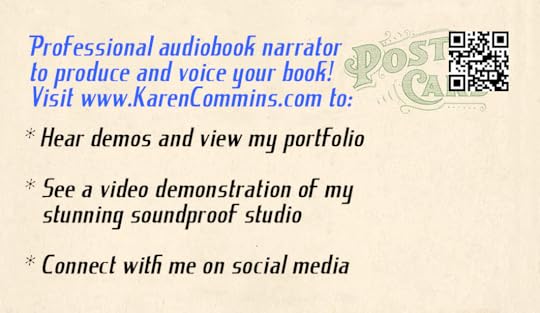
Of course, I still spell out my web site URL since many people would prefer to type it, may not have the ability to scan the code, or may not understand the code.
For what it’s worth, I used business card CDs before I moved back to paper cards with QR codes. While they had a “WOW” factor, they were expensive and time-consuming to produce. In addition, if I changed my demos, I couldn’t update any business card CDs on hand because I had to burn the files onto the CD. What’s worse, people sometimes had difficulties in playing the small, rectangular CD on their system. Today, so many computers are sold without CD readers that I would advise narrators to avoid making CDs.
This article includes a section creating and using QR codes in your marketing. You can use these ideas whether you are promoting a particular book or yourself as a narrator.
The post Are QR Codes Still Used? appeared first on Karen Commins.

